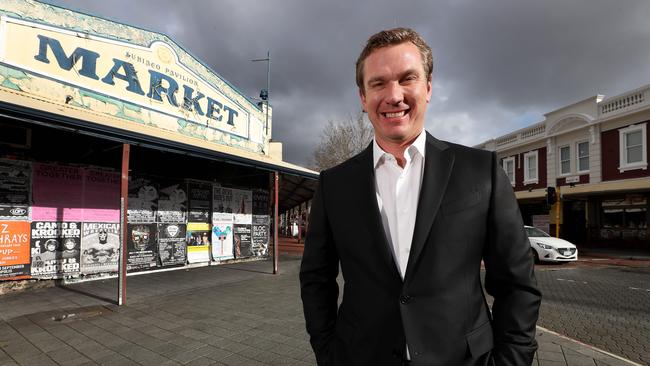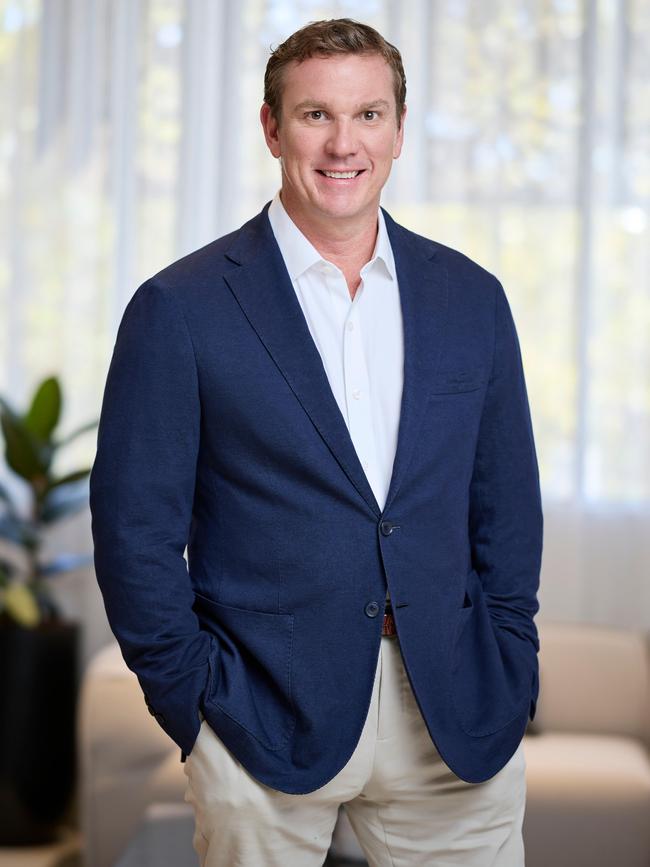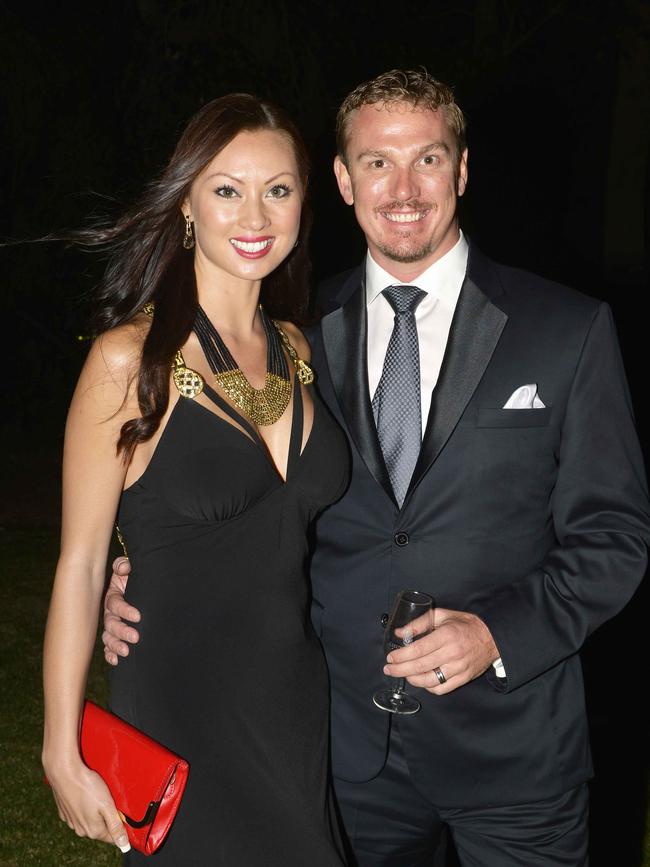Property rich lister Paul Blackburne on success and why money isn’t everything
Property rich lister Paul Blackburne reflects on 20 years of his Perth development firm, life lessons and leaving a legacy for his children.

The evening of Saturday November 11, 2023, was a special one in the life of Paul Blackburne.
Three hundred guests, including 80 of his staff and their partners, plus even a few competitors, gathered at Perth’s suave Subi Continental bistro and tavern to celebrate his apartment development firm’s 20-year anniversary and the unveiling of its new brand.
Formerly known as Blackburne Property Group, its founder says its new vision and bespoke brand – Blackburne – simply lets “the images of our quality projects speak more loudly than words”.
“We have created a business with value and made a fair return on the risks and the effort we have put in, while we have built a great brand known by thousands of happy customers. Which is hard when you are building apartments,” he says of the firm’s 20th anniversary. He says he invited some competitors to the function because “the industry benefits from us talking”.
“Blackburne is a trusted brand, well known in WA and more widely in Australia now. At the same time we also have a great team of staff with a great culture,” he says.
Blackburne has just moved into a new head office in Subiaco with a stylish fit-out focused on the staff, after spending the past 20 years in West Perth.

The new office is part of the $300m One Subiaco development on the old Subiaco Markets site, where Blackburne has built luxury apartments atop a new retail precinct.
“Now it is about setting a vision for the future. We are not about becoming bigger, we are about becoming better. Lifting the quality of reporting and systems within the group to help us undertake bigger projects,” he says.
“We keep the attributes of a private business with the strengths of a bigger listed corporation.
“Doing the stuff that big companies can do with the mindset of a smaller, more agile business.”
Blackburne is in the process of completing almost $1bn of projects this year and says one of the most important lessons learned of the past two decades has been to grow slowly and to “do what you can with your own money”.
“I’ve always focused on growing by reinvesting dividends from the business as equity and not using external investor money,” he says.
“We also generally try to use the Australian banks and keep the leverage relatively low as the effective interest rate on highly leveraged developments is so high that the lender of anything over a 65 per cent loan-to-value ratio (LVR) usually ends up consuming a large part of the profits and often leaving very little leftover.
“Most developers try to do larger projects than they can afford to do and have very little of their own equity to put in. They end up bringing in external investors and/or needing to get higher leverage on construction funding.
“This often means they make little or nothing from the project and mainly rely on fees to try and make a small profit. This can work when everything aligns well but it only takes a few things not to go to plan and the return for the developer ends up being little or nothing after many years of hard work and risk.”
Blackburne still keeps 10 to 30 per cent of the projects that he develops, to rent out, and says he has about 1200 apartments on his rent roll, which he can leverage to borrow for new investments.
He cautions against relying on a fee-driven model because “you effectively become a development manager for someone else rather than a developer”.
“In apartment development, attention to detail is everything. As projects get larger, small mistakes can have costly consequences,” Blackburne says.
“Focus on the customer and what they want rather than trying to maximise profits at all times. This mean you build a strong brand and also benefit financially long term as people are willing to trust your brand when buying off the plan.
“Also surround yourself with only the best people that fit in with the culture you are trying to create.”
Creating a meaningful legacy
Blackburne grew up in Gooseberry Hill in the Perth hills and when he left school, instead of completing an MBA he spent five years travelling across 45 countries.
His time backpacking through Cambodia in the 1990s, a country then ravaged by war, had a profound effect.
“I promised myself I wouldn’t spend my life in an office making money, but I realised it was difficult to make meaningful change for the things you believe in the world without money,” he says.
At the end of 2013 Blackburne co-founded The Child Protection Unit, an organisation combating child abuse and exploitation in Cambodia.
Supported by the Cambodian Children’s Fund, the CPU pairs Western police investigators with the Cambodian National Police to pursue cases of child abuse that are beyond the resources of local law enforcement.
Its mission is to ensure that abusers are brought to justice and that victims are cared for without further trauma.

Blackburne was inspired to help establish the unit when he saw an ABC television special on Scott Neeson, founder and executive director of the Cambodian Children’s Fund.
“I have said I want to give money to causes where there is government failure. Scott told me crimes against children don’t get investigated well so we employed a couple of Australian Federal Police people and struck an MOU (memorandum of understanding) with the Cambodian government,” he says.
“Every crime against children in Cambodia now gets reported and is investigated with professional techniques. Establishing the CPU was a good test for me to show how providing some money and partnering with the right organisations could make a real difference.”
He says starting the CPU coincided with an epiphany a decade ago whereby he began to think more deeply about the legacy he would leave for his children, who are now aged seven and 10.
“At least half of the purpose of life is to make great change and use your knowledge of the world to create change in the issues you believe in, and to set my kids up to do that in the future,” he says.
“It is about them now as much as it is me. That they can continue the mission I started.”
Blackburne is the son of a real estate agent, but he never wanted to follow in the family footsteps.
At one stage he dreamt of working for the United Nations. Instead, 20 years ago he borrowed $600,000 to buy part of the rent roll from his father’s firm, Blackburne and Joyce Real Estate, to start his own business.
His now retired father, John, is a consultant to his firm.
“I was lucky that my father was in real estate in the 1960s through to the 1990s and built a strong brand. There was a reputation there in the market when I started my business, but we have never been involved together financially,” he says.
“It was important to me to be able to build my business from scratch with my own finances, never relying on anyone else for support.
“In his retirement he agreed to work with me for half a day a week in brainstorming challenging issues. It is using the experience he has from over 50 years in business to be a sounding board for day-to-day management challenges and the bigger issues I am facing.”
Leading by example
It is now seven years since Blackburne debuted at No.3 on what was then known as the BRW Young Rich List with an estimated wealth of $536m – the highest of any West Australian under 40 years old.
This year he was valued on The List of the nation’s 250 wealthiest people, published by The Australian, at $681m.
Yet he worries wealth can become a unhealthy obsession.
“I’m not a billionaire and I don’t want to be one. What I mean by that is if the money becomes the main priority, the odds are you will make less of it,” Blackburne says.
“Making the customers, the staff, your health and your family the priority – plus having a little bit of luck – gives you better odds of having success in your business. While, of course, also being happy.
“Building wealth doesn’t always correlate to happiness. It can present a whole set of new challenges which, if not managed well, can lead people down the wrong path in life.”
His 10-year-old daughter, Aria, is already showing an interest in property and Blackburne says he and wife Charmaine are happy to encourage her.

As he approaches the age of 50 in two years, Blackburne says he is now looking to take a more strategic and less hands-on role in his business and thinking more about philanthropy.
“I am now focusing on how we can use the financial strength of what has been created through Blackburne and other investments to get more serious about investing in the causes the family believe in, which hopefully will be continued by our children as they grow. My mission is for them to be able to continue these causes when I am not around,” he says.
“I want also to work out how to value add to the business without being as involved in operations; While getting the headspace to look at what we can do outside apartment developments in Perth. Expanding to the east coast and build-to-rent are the big opportunities.”
Blackburne told The Australian in October that he has had so much success selling $1m to $2m apartments to baby boomer downsizers in his hometown that, for the first time, he is considering similar projects on Australia’s eastern seaboard.
The initial focus will be apartment projects for baby boomers in Sydney’s eastern suburbs and other affluent areas of the city where cashed-up “empty nesters” are seeking to downsize.
Asked about his outlook for the apartment market in 2024, he says the biggest challenge continues to be a shortage of skilled trades in construction and the lagging supply chain issues flowing from the post-Covid boom.
“But those pressures are easing and the levels of activity will normalise over the coming months. In Perth, builders and tradies are just starting to call around looking for work,” he says.
“The challenge now is supply. More good quality builders and planning reforms are essential. The demand is there.”
Blackburne has another $1bn of apartments in the pipeline coming to market over the course of 2024.
Construction of his $500m West Village project at Karrinyup in Perth’s northern suburbs – part of an overhaul of the shopping centre there co-owned by Unisuper – will start in the middle of next year and take about 2½ years to complete.
Blackburne acknowledges he has made mistakes in his career – thankfully no catastrophic ones – but stresses that by taking risks he has transformed the traditional negative stereotypes about apartment developers.
“The only way you grow and learn is by making mistakes. The important thing is not whether you make them but whether you learn from them. We are doing something no one has done before and the only way to do that is to try new things,” he says.
“It isn’t about creating cheap and ugly high-rise buildings. It is about creating quality and giving people value for money, building new and better communities within the project and the surrounding areas.
“Giving baby boomers, empty nesters the option of remaining in the area where they raised their family and where they feel comfortable. So it is not about breaking down communities, but rather creating them.”






To join the conversation, please log in. Don't have an account? Register
Join the conversation, you are commenting as Logout